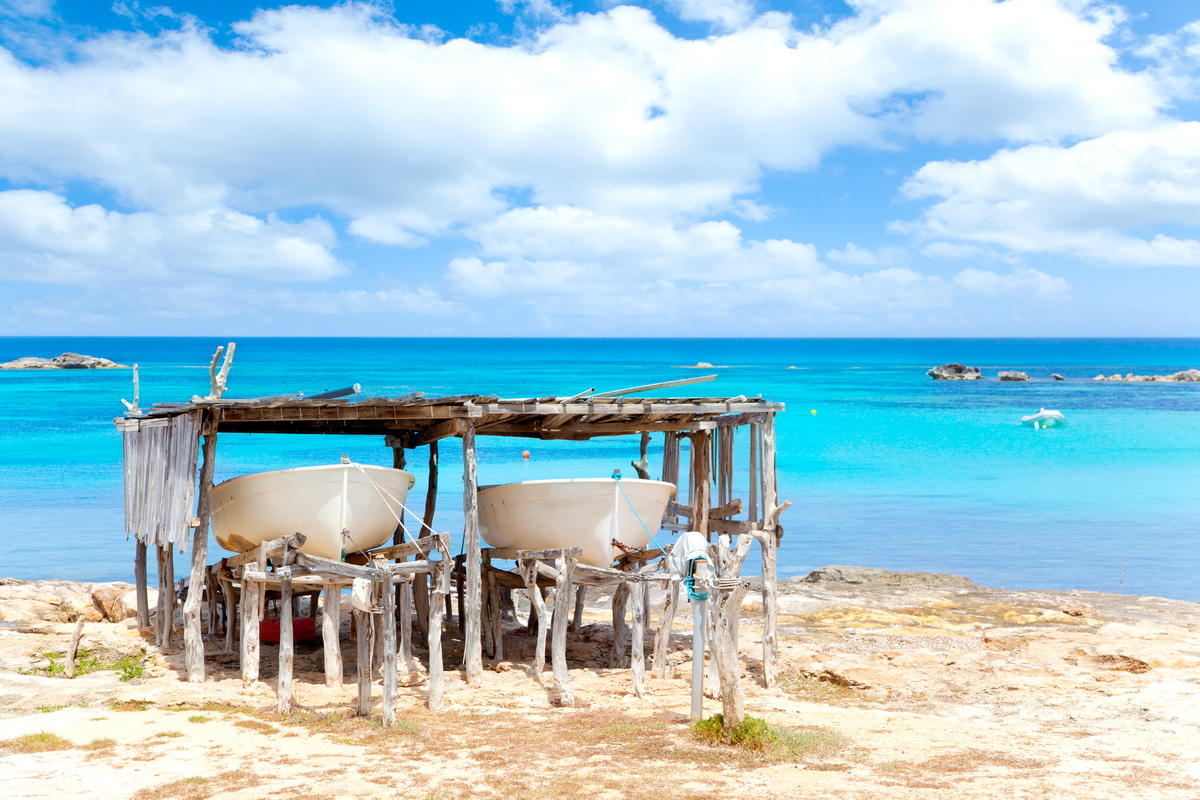Living in the Balearic Islands means home is an archipelago in the western Mediterranean Sea, off the eastern coast of Spain. The closest major cities are Valencia and Barcelona. These islands are a popular destination for Expats who want to enjoy the Spanish lifestyle while living in a beautiful and peaceful place. They are also popular with Expats who retire in Spain.
The Balearic Islands consist of four main islands: Majorca, Menorca, Ibiza, and Formentera. Each of these islands has its own unique features and attractions, making it challenging to choose the right one for you. This article will give you insider tips on the best places to live in the Balearic Islands as an Expat.
Languages of the Balearics
Both Catalan and Spanish are the official languages of the region. However, Catalan is the llengua pròpia or “own language” and is in common use. To make it more complex, the Baleric’s Catalan dialect is slightly different from mainland Catalunya.
The vast majority of the local population will happily speak Spanish. And, especially in tourist areas, English, German, French, and Italian may also be understood.
What’s in a Name?
If you are l iving in the Balearic Islands, you’ll hear the same island referred to in different ways. Here’s an easy table to help you keep track.
| English | Catalan | Spanish |
| The Balearic Islands | Illes Balears | Islas Baleares |
| Majorca | Mallorca | Mallorca |
| Minorca | Menorca | Menorca |
| Ibiza | Eivissa | Ibiza |
| Formentera | Formentera | Formentera |
| Cabrera | Cabrera | Cabrera |
| Espalmador | S’Espalmador | Espalmador |
Living in Majorca
Majorca, also known as Mallorca, is the largest of the Balearic Islands and the most popular among tourists. The island has a diverse landscape, ranging from sandy beaches to rocky mountains, making it an ideal location for outdoor activities. The capital city of Palma de Mallorca is a bustling town, offering plenty of job opportunities, internaitonal schools, and a vibrant nightlife scene. This is the most popular choive for people relocating to Mallorca.
For Expats who prefer a quieter life, the villages of Soller and Deia offer a more relaxed pace of life with picturesque scenery. Outside of the summer season, there are deserted beaches you have all to yourself. They are popular among artists, writers, and musicians who are looking for inspiration. These areas are also popular with Expats looking to retire in Mallorca.
Living in Menorca
Menorca is the second-largest Balearic island and a paradise for nature lovers. The island is a UNESCO Biosphere Reserve, and over 40% of the land is protected. It’s home to numerous bird species, including the endangered Balearic shearwater, and boasts beautiful beaches and coves. The island is ideal for hiking, cycling, and water sports.
The capital city of Mahon offers plenty of job opportunities and a rich cultural heritage. Ciutadella is another popular town known for its picturesque architecture and vibrant nightlife.
Living in Ibiza
Ibiza is known as the party island but has a quieter side that many Expats enjoy. The island is famous for its nightlife and party scene but is gaining populartity as a permenet living destination. Look closer, and you’ll find it’s home to numerous secluded beaches and hidden coves that offer a peaceful escape from the crowds.
Ibiza Town, the capital city, has a vibrant art scene and plenty of job opportunities in the tourism industry. This makes for an extremely internaitonal community.
Tip: My friend, Martín, has lived in Ibiza for 20 years and is adamant it is the most beautiful place in Spain. He loves Sa Caleta, Punta Galera, and the hike up Cap des Falco.
Living in Formentera
Formentera is the smallest of the Balearic Islands and an ideal location for Expats who want to escape the crowds. The island is only accessible by ferry from Ibiza, which keeps the number of tourists to a minimum. Formentera boasts pristine beaches with crystal-clear water, making it an ideal location for snorkeling and scuba diving.
The island has a relaxed atmosphere, and the local population is friendly and welcoming. The town of Sant Francesc Xavier is the island’s commercial center and offers plenty of job opportunities in the tourism industry foir the Expat community.
As a scuba diver, the idea of living on Formentera is so tempting. We’ve dived in a few places in Spain, but Formentera’s untouched reefs are agreed to be the best Spanish diving.
7 Tips for Working in the Balearic Islands as an Expat
- Make sure you are legally working if you are living in the Balearic Islands. If you are a non-EU citizen, you’ll need a Spanish work permit. There are cash-in-hand jobs, but these do carry risks, and you are not protected under employment law.
- Know the Language: While many people speak English in the Balearics, having a good grasp of the local language is important. This will help you communicate with your colleagues and customers and show that you respect the local culture.
- Choose the Right Industry: The Balearics are a popular tourist destination, so the hospitality industry is always in high demand. However, other industries, such as IT, finance, or real estate, are worth exploring if you’re looking for a more stable job.
- Get Your Paperwork Sorted: Before you start working in the Balearics, it’s essential to get your paperwork in order. This includes obtaining a NIE number (Número de Identificación de Extranjero) and registering with the social security system.
- Be Prepared for a Different Pace: The pace of life in the Balearics is generally slower than in other parts of Europe, so it’s important to be patient and adaptable. Don’t be surprised if things take longer than expected or if people don’t reply to emails straight away.
- Network: Building a network is essential when working in the Balearics. Attend local events and meetups, and connect with people in your industry on LinkedIn. You never know when a new opportunity might arise.
- Take Advantage of the Lifestyle: One of the biggest advantages of working in the Balearics is the lifestyle. Make the most of your weekends by exploring the islands, trying new activities, or simply relaxing on the beach. A healthy work-life balance is important, and the Balearics offer the perfect opportunity to achieve it. And find the gems away from the tourist attractions – long-term residents know the way!
Working in the Balearics as an Expat can be a rewarding experience if approached in the right way. By learning the language, choosing the right industry, getting your paperwork in order, being patient, networking, embracing the culture, and taking advantage of the lifestyle, you can set yourself up for a successful and enjoyable career in the Balearics.
Getting to the Balearics
Some Expats love that living on the islands gives them peace and quiet, away from it all. But it is really easy to get to most Balearic destinations.
The most common ways to get from mainland Spain to the Balearic Islands are by air and by sea. There are numerous flights to the Balearic Islands from many cities in mainland Spain, and several airlines operate regular flights throughout the year. Some of the major airlines include Iberia, Ryanair, Vueling, and Air Europa.
Tip: Watch for specials between mainland Spain and the Balearics with the budget carriers. Flights for as little as €10 each way are not uncommon off-season.
- Alison and Alastair bought tickets on Veuling to fly from Barcelona to Palma and return in June for less than €50 each. It would have been cheaper still if we’d been a little more flexible on the times we flew.
Alternatively, there are several ferry companies that operate regular services from mainland Spain to the Balearic Islands. The most popular ferry routes are from Barcelona, Valencia, and Denia, with several daily departures during peak season.
Traveling by ferry can be a great way to explore the islands and take in scenic views along the way. Many of the ferries are well-equipped with comfortable seating, restaurants, and even swimming pools, making the journey a pleasant experience.
Overall, there are plenty of options for getting to the Balearic Islands, whether you prefer to fly or take a ferry. It all comes down to personal preference, budget, and the amount of time you have to spare. Find out more in our deatiled article on transportion in Spain.

Does Living in The Balearic Islands Appeal To You?
Choosing the right Balearic island to live on will depend on your preferences and lifestyle. Majorca is ideal for Expats who want a bustling city and plenty of job opportunities. Menorca is perfect for nature lovers who enjoy outdoor activities. Ibiza is a party island but also has a quieter side that many Expats enjoy. Formentera is a secluded paradise that is perfect for Expats who want to escape the crowds.
Regardless of which island you choose, the Balearic Islands offer a high quality of Expat life, a relaxed pace of life, and a rich cultural heritage. As an Expat, you’ll be welcomed by the friendly and welcoming local population, and you’ll enjoy the mild Mediterranean climate and the stunning scenery the islands offer.
FAQ – Living in The Balearic Islands
What is the cost of living like in the Balearic Islands?
The cost of living in the Balearic Islands can vary depending on which island you are on and your lifestyle. However, generally speaking, it is more expensive than the cost-of-living in mainland of Spain. Expect to pay more for housing, food, and entertainment.
Do I need to speak Spanish to live in the Balearic Islands?
While knowing some Spanish is helpful, it’s not entirely necessary. The islands are very tourist-friendly, and many people speak English, especially in the hospitality industry. However, learning some Spanish and Catalan will help you better integrate into the local community.
Can I find work as an Expat in the Balearic Islands?
Yes, finding work as an Expat in the Balearic Islands is possible. The hospitality industry is a significant employer, especially during the high season. However, it’s essential to note that speaking Spanish will give you a significant advantage in the job market. You will need a Spanish work permit if you are a non-EU citizen.
Is healthcare easily accessible in the Balearic Islands?
Yes, healthcare is easily accessible in the Balearic Islands. There are public and private healthcare options, and the level of care is generally very high. However, as an Expat, investing in Spanish private health insurance is recommended for peace of mind.
How do I meet other Expats and locals in the Balearic Islands?
There are plenty of opportunities to meet other Expats and locals in the Balearic Islands. Joining social clubs, attending events, and volunteering are all great ways to meet new people.








